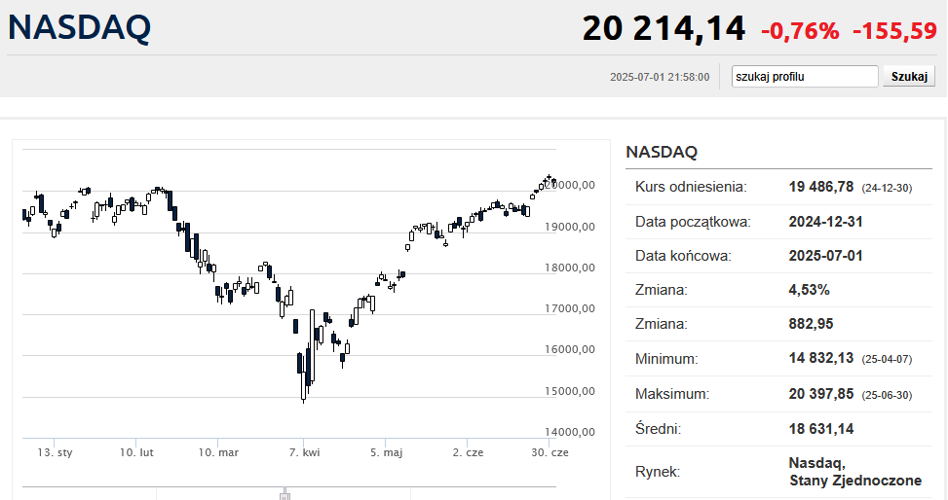Dow Jones up, but big techs heavily discounted

Wall Street ended Tuesday's session with a solid gain for the Dow and declines for the S&P 500 and Nasdaq as investors abandoned technology stocks in favor of other industries, including health care companies.
The Dow Jones Industrial at closing was up 0.91 percent to 44,494.94 points. The S&P 500 was down 0.11 percent to 6,198.01 points. The Nasdaq Composite was down 0.82 percent to 20,202.89 points. The Russell 2000 mid-cap index was up 0.94 percent to 2,195.20 points. The VIX index was up 0.60 percent to 16.83 points.
Investors abandoned tech giants like Nvidia and Microsoft and instead bought healthcare stocks. Amgen and UnitedHealth each rose more than 4%, while Merck and Johnson & Johnson rose more than 3% and about 2%, respectively.
“It was really risky the last two months of the quarter. It was buying stocks that had really strong growth drivers, like AI and technology,” said Anthony Saglimbene, chief market strategist at Ameriprise. “I think we’ve exhausted that trade.”
Markets are growing expectations that the U.S. economy will weather uncertainty over the tariff schedule during Donald Trump's presidency.
"We think it's going to be a broader recovery. I think with the Fed cutting rates in the second half of this year or next year, we could see a gradual recovery — because there's quite a bit of built-up demand right now, particularly in those interest-rate-sensitive parts of the market," Mike Wilson, chief U.S. equities strategist and chief investment officer at Morgan Stanley, said Monday on CNBC's "Closing Bell."
Electric vehicle maker Tesla fell about 5% after President Donald Trump suggested in a post on Truth Social that the Department of Government Efficiency (DOGE) should investigate government subsidies received by CEO Elon Musk's companies.
Musk criticized President Donald Trump’s massive tax and spending bill, calling it “completely insane and destructive” over the weekend. This isn’t the first time Trump and Musk have clashed over the administration’s spending plans, as a feud erupted between them earlier this year.
The bill passed the Senate on Tuesday in a 51-50 vote. The package now moves to the House of Representatives, which can still reject the changes to the legislation.
Earlier in the day, Federal Reserve Chairman Jerome Powell confirmed at a European Central Bank panel in Portugal that the Fed would likely cut interest rates again if not for tariffs.
He added that any future action would depend on the data and did not directly answer whether July would be too early for interest rate cuts.
“We effectively held off when we saw how big the tariffs were, and basically all of the U.S. inflation forecasts went up significantly as a result of the tariffs,” Powell said.
Investors are banking on agreements between the U.S. and its trading partners as Trump's 90-day reprieve on his higher tariffs is set to expire next week.
Zachary Hill, head of portfolio management at Horizon Investments, however, believes the market is expecting a lot, so volatility could still be on the horizon.
“Investors have definitely increased their positions over the last few weeks, so I think that’s a potential risk,” he told CNBC.
Stocks have made an impressive comeback from sharp declines in April, after Trump's tariff policies pushed the S&P 500 close to bear market territory.
The major indexes have since rebounded sharply. The S&P 500 closed the second quarter with a 10.6% gain, while the Nasdaq rose nearly 18% during the period.
The PMI index, which measures the economic situation in the US industrial sector, prepared by S&P Global, amounted to 52.9 points in June, compared to 52.0 points in the previous month - it was reported in the second calculation. The initial estimate was 52 points.
The US industrial activity index in June was 49 points, compared to the consensus of 48.8 points and 48.5 points in the previous month, the Institute for Supply Management (ISM) reported.
The number of unfilled jobs in the US, according to the JOLTS survey, was 7.769 million in May, compared with a revised 7.395 million in the previous month. The number of vacancies was expected to be 7.32 million.
On the oil market, WTI contracts for August are up 0.97 percent to USD 65.74 per barrel, while August Brent futures are up 0.99 percent to USD 67.40 per barrel. (PAP Biznes)
pr/
bankier.pl






